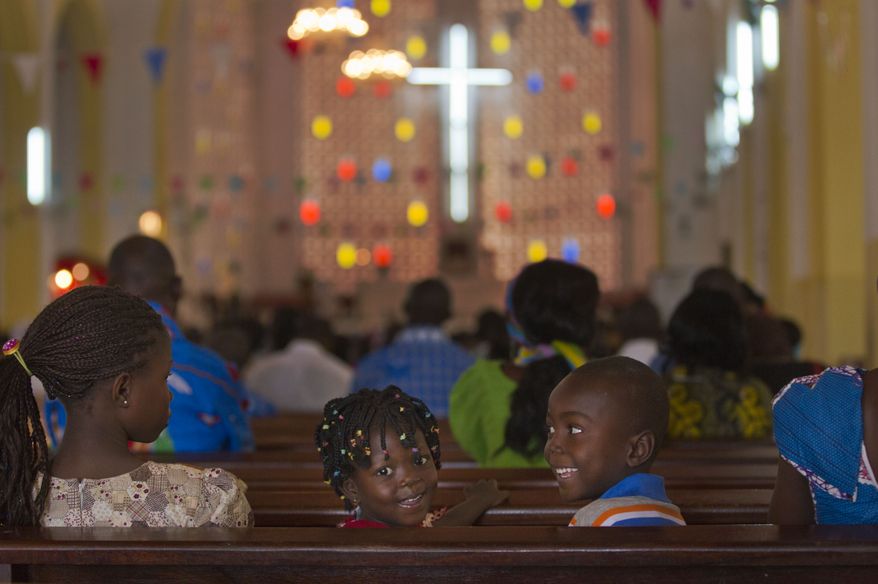Recently, I’ve had several questions sent my way on the practicality of having all ages in communal worship together with adults. While some of the questions pertained to older generations participating in church, most of them were focused on the challenge of having children in the church service. But after conversing for a bit, it was evident that no one needed to be convinced that children should be there at some point (that reconciled fairly quickly after some theological, developmental, and sociological evidences of the benefits of intergenerational worship); the bigger felt need was just for some practical and simple ways to make it possible for children to be integrated into the service.
Our traditional service structures often make it difficult to extend the hand of welcome to the next generation and it can be difficult to maneuver within those confines and find ways of incorporating all generations.
With that in mind, here are some practical tips and tools for Intergenerational Worship Services that might be useful for your faith community. I’ve shared these in the past and have had a lot of great feedback from multiple churches and denominations. I’d love to hear what your church is doing to make room for all ages to find a space to worship together.
1. Kid’s Worship Team – Let’s redefine worship as more than singing before the sermon. Worship seeks to put the attention on God and give Him the honor that is due. And kids are amazing at doing this. A Kid’s Worship Team doesn’t necessary lead “singing” but they worship through hospitality (holding doors, handing out bulletins, etc), prayer (they go forward during prayer time and pray for themselves and others) and generosity (they take up the communion and pray over it).
For our team, the kids followed a weekly schedule, just like the adult worship team, and if they missed their Sunday, they had to get someone to take their spot. They also had to go through a training on worship with me before they could serve.
2. Sermon Notes – There are a lot of great templates out there for sermon notes and for older kids, it’s a great way to keep them involved with the service. In one church, if a child completed their sermon notes, they could get something out of a treasure box and the completed form was given back to their parents so the parents could have a follow-up conversation with their kids at home.

3. Call Out the Kids – Kids love to get attention and they love when they get to be drawn into “adult” things like the sermon. We often asked whoever was speaking to at some point in the sermon just say something like, “Hey kids, have you ever seen this?” or something else that would be appropriate to the text to help draw the kids into the story. It’s amazing how just that little comment really drew them in and helped redirect their attention to the service.
4. Interactive Teaching and Learning – Anything interactive is great! One of the ways our current church engages the kids is if there is a topic that involves a story from the Bible, the pastor will have the kids help act out the story. Everyone loves it – it’s spontaneous so things definitely go wrong, but the whole congregation gets involved and no one forgets the Scripture we studied that week.
5. Busy Bags – Busy bags get a bad rap, mostly because people don’t understand the developmental science behind them. Have “busy bags” but explain to parents and other church members that these activities aren’t intended to distract the kids but rather to help the kids use all of their developing senses; studies show if their hands and eyes are busy, their ears will be listening.
Quiet activities like lacing cards, stickers scenes, foam craft kits, beads and pipe cleaners, small puzzles and coloring are all great ways to engage your kinesthetic and visual learners.
6. Pew Boxes or Worship Boxes – Similar to busy bags, these boxes can be placed underneath chairs or pews and filled with quiet activities and books for kids to use during worship services. I love the ones put together by Traci Smith and outlined here
7. Active Involvement – The difference between “having kids in Big Church” and welcoming kids into corporate worship lies basically in participation. Are children being invited to actively participate or passively observe? Inviting children and youth to be part of the order of worship has incredible sway in creating a sense of inclusion and welcome.
actions – it can just be a song that they like – my son loves, “No Longer Slaves” and can’t wait to lead it), and pray. Being involved signals that we have a place in the congregation – we are a part of something bigger – and everyone needs to know that truth.
There are beautiful opportunities for us to connect with one another in deep and meaningful ways when we worship together. Finding those treasures are a huge part of why many churches are growing more and more intergenerational in their approach to community. And the reward is the opportunity for all of us to grow closer to Jesus as lifelong disciples.

If you have ever felt alone in your heart for intergenerational ministry, if you have ever wondered what the next right step is or been curious about how you can best serve your church’s discipleship or mentorship ministry, then a ReFocus Ministry Coaching Cohort might the place for you.
ReFocus Coaching Cohorts provide ministry leaders with the opportunity to expand their leadership skills in a twelve-week shared learning experience. Facilitated by an experienced coach, a cohort group of 7-10 individuals from multiple faith organizations meet weekly to explore and apply the principles of leadership in generational discipleship, intergenerational ministry, and church culture transition. Through extensive exploration, inquiry and dialogue, the coach and fellow cohort members help participants identify their role in generational discipleship within their faith community and deepen their leadership capability.
NEW COHORT FORMING FALL 2022
Benefits
- Accountability and growth within a community of like-minded ministers
- Access to resources available only to cohort members, including up to one year of monthly personal coaching
- Real-life moments and collective learning within the group that can be addressed by both the coach and the other members.
- Ability to participate in ReFocus presenter platform as a local ReFocus representative.
ReFocus cohorts provide a confidential, open environment for ministers to strengthen their effectiveness in ‘real-time’ situations. It is intended for people who have experience in ministry and are ready to build the skills needed to be leaders in generational discipleship and intergenerational ministry.
Included in Coaching Cohort Package
- Twelve weekly trainings/Zoom calls with coach.
- Choice of 1 webinar with resources for church/congregation (for use within one year of cohort start).
- Family Faith Formation TALK TOOLS curriculum (Digital download available after first 12 weeks).
- One year of monthly, 30-minute, one-on-one coaching conversations.
- Access to private Facebook group for cohort members only.
- Lifetime 10% discount on all ReFocus seminars, workshops, webinars, and/or coaching packages


